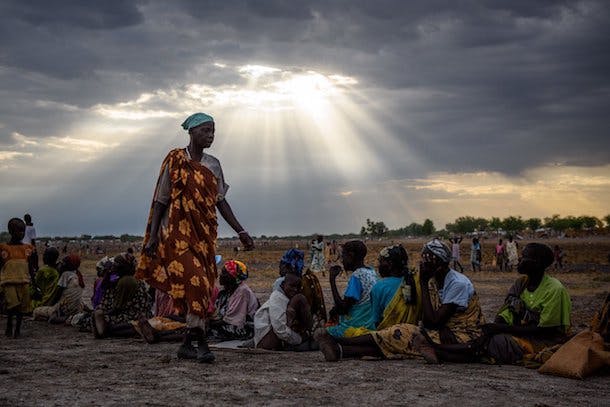
Editor’s Note: Donate to the UN’s humanitarian fund in South Sudan to help families in need.
Humanitarian aid in South Sudan has meant many things: Children reunited with their parents; civilians treated for diseases like malaria and cholera; and food for families threatened by famine.
Yet, four years after conflict erupted in South Sudan, suffering continues to grow, needs are outpacing resources, and the international community must continue to focus on helping vulnerable people while urging peace.
According to the United Nations Office for the Coordination of Humanitarian Affairs (OCHA),7.6 million people in South Sudan are in need of aid, nearly 4 million have been displaced from their homes, and 6 million people are food insecure. Civilians continue to bear the brunt of the conflict, including facing death, the recruitment of child soldiers, and gender-based violence.
UN agencies, alongside local communities and humanitarian partners, are urgently working to assist the people of South Sudan. Gaining access to deliver lifesaving aid continues to be a challenge facing humanitarian responders, who often risk their lives: Since December 2013, 85 aid workers have been killed in South Sudan. Additionally, only 71% of the funding requested for the humanitarian response in 2017 has been provided.
Below is an overview of how the UN is helping provide aid to those in need, and what you can do to help people in South Sudan.
Office for the Coordination of Humanitarian Affairs (OCHA)
OCHA mobilizes humanitarian assistance to reach the world’s most vulnerable, assess the needs in crisis situations, and brings together humanitarian partners to coordinate the response to emergencies, including in South Sudan. OCHA’s humanitarian needs overview for South Sudan in 2018 can be found here.
World Food Programme (WFP)
WFP and partners have provided food and assistance to millions of people in South Sudan, including through air drops in hard-to-reach areas. Earlier this year, parts of South Sudan faced famine, which was eased through a scale up of the humanitarian response. Yet hunger and food insecurity remain widespread and WFP requires US$134 million to provide food and nutrition assistance from August 2017 through January 2018.
UN Children’s Fund (UNICEF)
UNICEF and partners work to protect children, support education, nutrition, and immunization for children, and provide safe drinking water and sanitation. So far this year, UNICEF and partners have treated more than 160,000 children with severe malnutrition and provided over 750,000 people with safe drinking water.
UN Population Fund (UNFPA)
UNFPA is working to strengthen the health care system to improve reproductive health services, train midwives, combat gender-based violence, and assist survivors of gender-based violence through counseling.
UN Development Programme (UNDP)
UNDP in South Sudan’s goal is to support peace and reconciliation. The agency works to build more resilient communities, reinvigorate local economies, empower women and girls, and strengthen governance.
World Health Organization (WHO)
South Sudan has faced outbreaks of malaria and cholera since conflict started. There were 1.5 million cases of malaria from January to September of 2017 alone. WHO and partners work to prevent and treat diseases, provide health supplies and services, and train health workers.
Additionally, the UN has a peacekeeping mission in the country, the UN Mission in the Republic of South Sudan (UNMISS), whose mandate includes “protection of civilians, human rights monitoring, and support for the delivery of humanitarian assistance and for the implementation of the Cessation of Hostilities Agreement.”
HOW YOU CAN HELP
As UN Secretary-General Antonio Guterres recently said, “When anyone’s human rights are denied, everyone’s rights are undermined. We must stand up for human rights – every day, everywhere.”
Each of us can help support the humanitarian response in South Sudan. Here are two ways to get involved:
Donate to the UN’s South Sudan Humanitarian Fund to support UN agencies and humanitarian partners in the country get help to people in need of assistance.
Raise your voice to keep attention on the plight of civilians in South Sudan, to press leaders to work for peace, and to advocate for adequate resources and access to deliver lifesaving humanitarian aid.
[Photo: OCHA]



 View All Blog Posts
View All Blog Posts